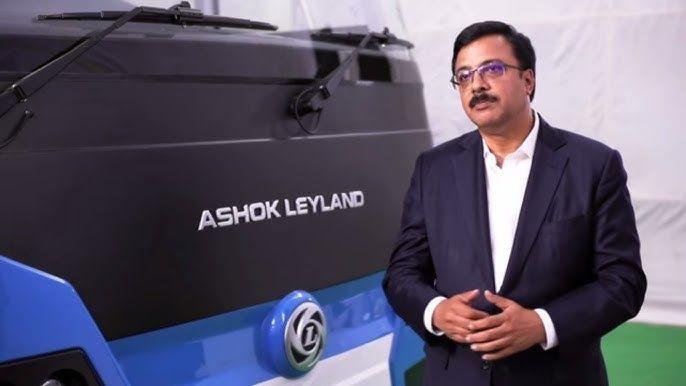
Ashok Leyland, the flagship company of the Hinduja Group and India’s second-largest commercial vehicle manufacturer, has announced a landmark investment of ₹5,000 crore ($571 million) over the next 7–10 years to set up advanced battery manufacturing in India. This initiative, unveiled on September 1, 2025, marks the beginning of an exclusive strategic partnership with China Aviation Lithium Battery Technology (CALB) Group, one of the world’s leading EV battery suppliers.
The partnership is aimed at building a localized battery supply chain in India, accelerating the adoption of electric vehicles, and aligning with the government’s push for sustainable mobility.
Scope of Investment and Production Plans
Ashok Leyland’s ₹5,000 crore investment will cover the entire battery value chain, from cell manufacturing to battery pack assembly. The initial focus will be on supplying batteries to Ashok Leyland’s electric trucks and buses, as well as to Switch Mobility, its EV-focused subsidiary. Over time, the scope will expand to energy storage systems and other non-automotive applications.
The company also plans to establish a Global Centre of Excellence for research and development. This hub will focus on innovations in battery materials, recycling, battery management systems, and advanced manufacturing technologies to strengthen India’s global competitiveness in EV supply chains.
Role of CALB
CALB, ranked as the seventh-largest global EV battery supplier, brings its technological expertise and global-scale manufacturing experience into this collaboration. The company supplies batteries to leading Chinese automakers such as GAC, Changan, Leapmotor, and XPeng, while also investing in industrial bases across China, Europe, and ASEAN.
The agreement was signed by Shenu Agarwal, MD & CEO of Ashok Leyland, and Jacky Liu, CEO of CALB (HK) Co., Ltd., in the presence of Shom Hinduja, President of Alternative Energy and Sustainability Initiatives at the Hinduja Group.
Strategic Objectives
The partnership targets three key goals:
Reducing India’s dependence on imported batteries and promoting the Atmanirbhar Bharat vision.
Powering Ashok Leyland’s EV portfolio while catering to external demand in the automotive and energy storage sectors.
Creating a strong foundation for R&D through the Global Centre of Excellence.
Market Impact and Economic Benefits
The announcement comes at a time when Indian automakers are collectively investing over ₹85,000 crore in EV and lithium-ion battery manufacturing in 2025. The domestic battery market, valued at $12.68 billion this year, is projected to grow to $20.97 billion by 2030 at a CAGR of 10.59%.
This large-scale investment by Ashok Leyland is expected to generate thousands of jobs across manufacturing, R&D, and allied industries. By localizing production, the company aims to bring down battery costs, making EVs more affordable for Indian consumers and pushing EV adoption at a faster pace.
Stock Market Response
Investors responded positively to the development. On September 2, 2025, Ashok Leyland’s shares rose 3.75% to an intra-day high of ₹132.8 on the BSE, pushing its market capitalization to ₹77,700 crore. The stock has gained 6% in the last 15 days and 2% over the past year, outperforming the Sensex, which fell 2.6% in the same period.
Leadership Statements
Dheeraj Hinduja, Chairman of Ashok Leyland, said the company is “deeply committed to shaping the future of sustainable mobility in India in alignment with the government’s vision.” He added that the partnership with CALB will help accelerate EV adoption and reduce dependence on fossil fuels.
Shenu Agarwal, MD & CEO of Ashok Leyland, emphasized that the initiative will first serve the automotive sector and then expand into non-automotive applications. He confirmed that a Global Centre of Excellence will be created to drive innovation in the battery ecosystem.
Broader Context
Ashok Leyland’s investment is part of its broader electrification strategy, which includes EVs, charging infrastructure, vehicle financing, and leasing. The company already offers products powered by electric, CNG, LNG, and hydrogen, and operates in 50 countries with 54,000 touchpoints worldwide.
The collaboration also coincides with CALB’s global expansion plans, including a €2 billion battery factory in Portugal scheduled to begin production in 2026.
Sales Performance
In August 2025, Ashok Leyland reported a 2% year-on-year increase in domestic sales at 13,622 units. The medium and heavy commercial vehicle segment grew 8% year-on-year, while the light commercial vehicle segment saw modest growth of 1%.
As the second-largest commercial vehicle manufacturer in India, the fourth-largest bus maker globally, and the thirteenth-largest truck manufacturer, Ashok Leyland is positioning itself at the forefront of India’s clean mobility shift.
Challenges Ahead
While the ₹5,000 crore investment promises significant long-term gains, returns are expected to materialize only over a 7–10 year horizon. Additionally, geopolitical relations between India and China could impact the partnership, though the focus on localized production helps mitigate such risks.
Conclusion
Ashok Leyland’s partnership with CALB represents a transformative step toward building a localized battery ecosystem in India. By combining global expertise with local ambitions, the initiative aims to strengthen India’s EV supply chain, drive down battery costs, and accelerate the country’s transition toward sustainable mobility.




